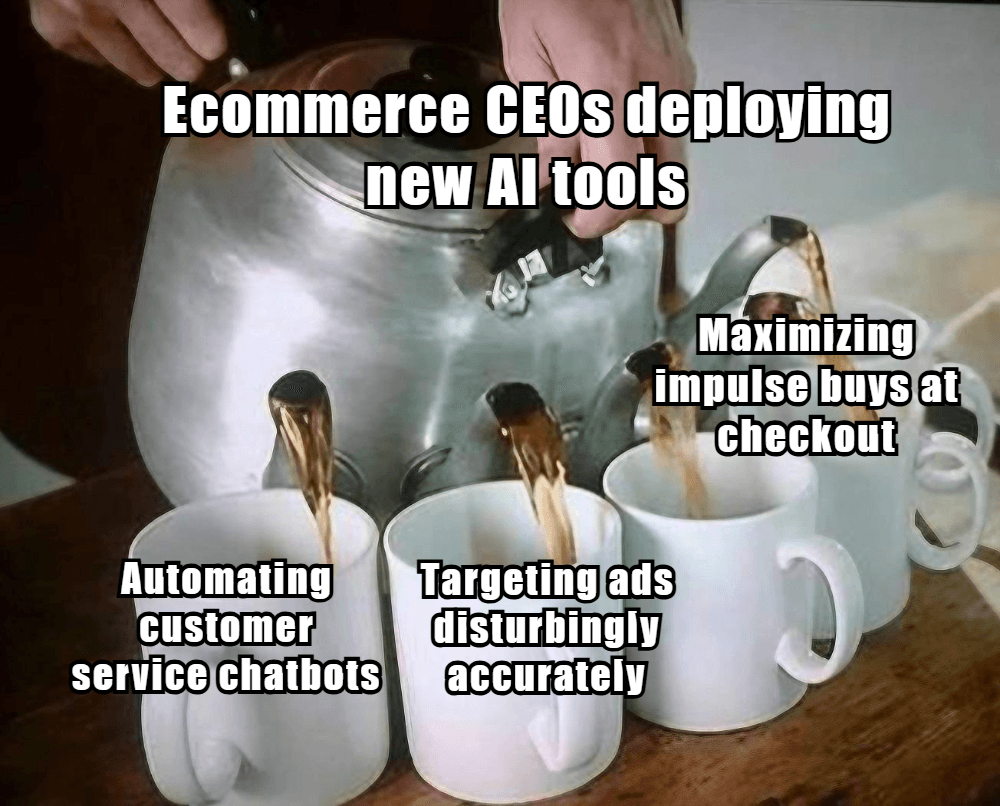E-commerce AI Tools: Transforming Online Retail in 2025
The e-commerce industry has witnessed a massive transformation over the years, and in 2025, artificial intelligence (AI) tools are at the forefront of this revolution. These tools are empowering businesses to deliver personalized shopping experiences, optimize operations, and boost sales like never before. Whether you're an established online retailer or just starting your e-commerce journey, e-commerce AI tools can help you stay competitive and meet customer expectations. Let’s explore how these tools work, their benefits, and the best options available today.
What Are E-commerce AI Tools?
E-commerce AI tools are software solutions powered by artificial intelligence technologies such as machine learning, natural language processing (NLP), and predictive analytics. They automate and enhance various aspects of online retail, from customer service to pricing optimization.
Key Functions of E-commerce AI Tools

Personalized Recommendations: Suggest products based on customer behavior and preferences.
Dynamic Pricing: Adjust prices in real-time based on market trends and competitor data.
Fraud Detection: Identify suspicious transactions to prevent fraud.
Customer Support Automation: Use AI chatbots to provide instant assistance.
SEO Optimization: Create SEO-friendly content for better visibility.
Benefits of Using E-commerce AI Tools

AI tools offer a wide range of benefits that can transform your e-commerce business:
1. Enhanced Customer Experience
AI-powered recommendation engines, such as those used by SHEIN, analyze purchase history and browsing behavior to suggest relevant products. This personalization helps customers find what they need quickly, improving satisfaction and loyalty.
2. Improved Operational Efficiency
Automating routine tasks like inventory management, order processing, and package tracking software integration reduces human error and saves time. For example, tools like Prisync automate dynamic pricing strategies to ensure competitiveness without manual intervention.
3. Higher Conversion Rates
AI tools can curb cart abandonment by sending personalized offers at checkout or through follow-up emails. Dynamic Yield is an example of a tool that uses real-time data to increase conversions.
4. Cost Savings
By automating processes like fraud detection and customer support, businesses can reduce operational costs while maintaining high-quality service.
5. Better Marketing Campaigns
AI tools such as Blueshift analyze customer data to create targeted campaigns that boost engagement and ROI.
Top E-commerce AI Tools in 2025
Here’s a list of some of the best e-commerce AI tools available today:
Tool Name | Key Features | Best For | Rating |
Dynamic Yield | Personalized shopping experiences | Large retailers | 9/10 |
Prisync | Dynamic pricing optimization | Competitive markets | 8.5/10 |
Clerk.io | Smart search & product recommendations | Improving search accuracy | 9/10 |
Octane AI | Conversational marketing | Customer engagement | 8/10 |
WeGlot | Multilingual site translation | Global e-commerce stores | 8/10 |
Hypotenuse AI | SEO-optimized content creation | Content-heavy stores | 9/10 |

1. Personalized Product Recommendations
Recommendation engines analyze large datasets to predict what customers will want next. For example, Nosto uses real-time data to tailor product suggestions across web pages and email campaigns.
2. Dynamic Pricing
Tools like Kimonix analyze market trends, demand patterns, and competitor pricing to adjust product prices dynamically, ensuring profitability while staying competitive.
3. Fraud Detection
AI fraud detection systems monitor transactions for unusual patterns or behaviors that could indicate fraud, protecting both businesses and customers from losses.
4. Smart Search Functionality
Clerk.io improves search accuracy by understanding natural language queries, synonyms, and shopper intent, ensuring customers find what they need quickly. Experro is another great platform with advanced semantic search capabilities that understand user intent for more accurate and personalized results
5. Automated Customer Support
AI chatbots like Lyro AI handle customer queries instantly across multiple languages, offering seamless support without human intervention.
Real-World Examples of E-commerce AI Tools

SHEIN: Uses personalized recommendation engines to tailor product suggestions based on browsing behavior.
Adobe Sensei: Embedded in Adobe Commerce (Magento), it provides visual search capabilities and automated merchandising for large retailers.
ViSenze: Allows customers to search for products by uploading images, making it ideal for fashion retailers looking to enhance product discovery.
Comparison Table: Traditional vs AI-Powered E-commerce
Aspect | Traditional Ecommerce | AI-Powered Ecommerce |
Personalization | Limited | Highly tailored recommendations |
Pricing Strategies | Static pricing | Dynamic pricing based on real-time data |
Fraud Prevention | Reactive | Proactive detection |
Customer Support | Manual responses | Instant chatbot assistance |
Marketing Campaigns | Generic targeting | Data-driven personalization |
In 2025, ecommerce AI tools are no longer a luxury—they’re a necessity for businesses aiming to thrive in a competitive market. These tools streamline operations, enhance customer experiences, boost sales conversions, and reduce costs through automation and data-driven insights.
Whether you're looking for personalized recommendations with Nosto or dynamic pricing strategies with Prisync, there’s an e-commerce AI tool suited for your needs. Start integrating these solutions into your business today to stay ahead in the ever-evolving e-commerce landscape!
FAQs
1. What are e-commerce AI tools?
E-commerce AI tools are software solutions that use artificial intelligence technologies to automate processes like product recommendations, dynamic pricing, fraud detection, and customer support.
2. How do these tools improve customer experience?
By analyzing customer data in real-time, these tools offer personalized shopping experiences, faster support responses through chatbots, and tailored marketing campaigns.
3. Are e-commerce AI tools expensive?
Many e-commerce AI tools offer scalable pricing models or free versions with basic features. For example, Clerk.io provides free modules for smart search functionality5.
4. Can small businesses benefit from these tools?
Absolutely! Tools like Hypotenuse AI are designed for businesses of all sizes and help small retailers create SEO-optimized content efficiently.